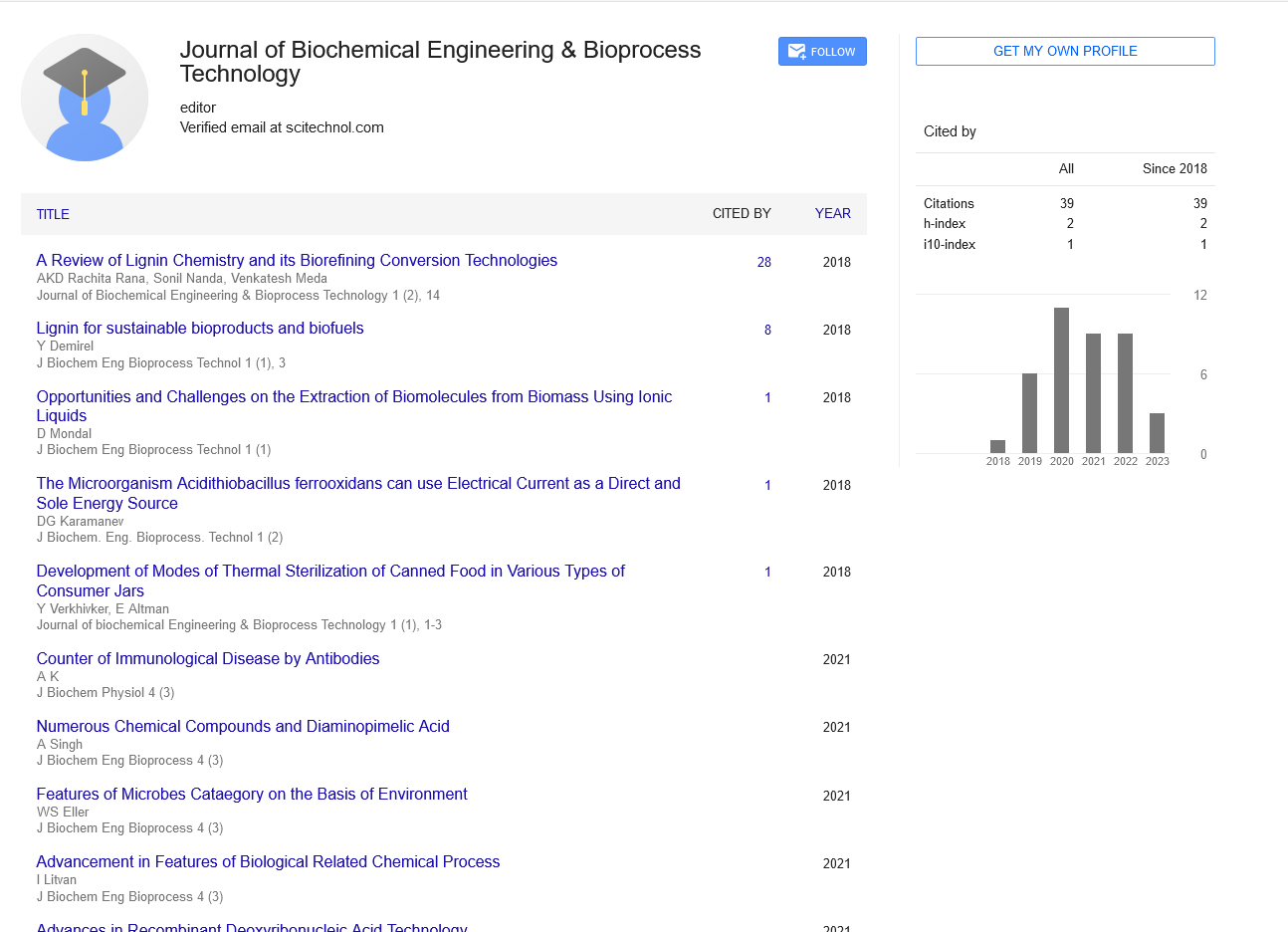Opinion Article, J Biochem Eng Bioprocess Vol: 6 Issue: 2
Biochemical Engineering for Therapeutic Protein Production: Challenges and Revolutions in Biopharmaceutical Manufacturing
Takashi Sora*
1Department of Biochemical Engineering & Bioprocess Technology, Tokyo Institute of Technology, Tokyo, Japan
*Corresponding Author: Takashi Sora,
Department of Biochemical Engineering &
Bioprocess Technology, Tokyo Institute of Technology, Tokyo, Japan
E-mail: soratakashi@gmail.com
Received date: 22 May, 2023, Manuscript No. JBEBT-23-106931;
Editor assigned date: 24 May, 2023, Pre QC. JBEBT-23-106931 (PQ);
Reviewed date: 15 June, 2023, QC No. JBEBT-23-106931;
Revised date: 22 June, 2023, Manuscript No. JBEBT-23-106931 (R);
Published date: 29 June, 2023, DOI: 10.35248/jbebt.1000060.
Citation: Sora T (2023) Biochemical Engineering for Therapeutic Protein Production: Challenges and Revolutions in Biopharmaceutical Manufacturing. J Biochem Eng Bioprocess 7:2.
Keywords: Bioprocess
Description
Biochemical engineering plays a vital role in the production of therapeutic proteins, which are essential for treating a wide range of diseases. This study provides a brief overview of the challenges and breakthroughs in biopharmaceutical manufacturing for therapeutic protein production. It explores key aspects of biochemical engineering, including cell line development, bioreactor design, purification strategies, and process optimization. Additionally, it discusses the challenges associated with protein expression, glycosylation, product quality, and regulatory compliance. Furthermore, the study highlights the breakthroughs in bioprocessing techniques, such as continuous manufacturing, high-throughput analytics, and advanced process control, which enhance efficiency, productivity, and product quality in therapeutic protein production.
Cell line development: Optimizing protein expression
Cell line development is a difficult step in therapeutic protein production, as it influences protein expression levels, product quality, and process scalability. This section discusses the challenges associated with cell line development, including cell line stability, productivity, and protein folding. It explores the use of recombinant DNA technology, genetic engineering, and host cell engineering techniques to optimize protein expression. Additionally, it highlights emerging technologies, such as genome editing and synthetic biology, for enhancing cell line development and protein production.
Bioreactor design: Creating optimal growth conditions
Bioreactor design is essential for creating optimal growth conditions and maximizing protein production. This section discusses the challenges associated with bioreactor design, including mass transfer limitations, shear stress, and oxygen transfer. It explores the use of advanced bioreactor technologies, such as single-use bioreactors, perfusion systems, and microcarrier-based systems, for improving cell growth and protein production. Additionally, it highlights the importance of process monitoring and control in maintaining optimal bioreactor conditions.
Purification strategies: Ensuring product quality
Purification of therapeutic proteins is an essential step to ensure product quality, safety, and efficacy. This section discusses the challenges associated with protein purification, including complex protein structures, post-translational modifications, and impurity removal. It explores the use of chromatography, filtration, and advanced purification techniques, such as membrane-based separations and affinity-based capture, for efficient and selective protein purification. Additionally, it highlights the importance of process validation and quality control to ensure the integrity and consistency of the purified therapeutic proteins.
Process optimization: Enhancing efficiency and yield
Process optimization is essential for maximizing efficiency, yield, and cost-effectiveness in therapeutic protein production. This section discusses the challenges associated with process optimization, including process variability, scale-up issues, and process robustness. It will explores the use of statistical Design of Experiments (DoE), mathematical modeling, and high-throughput analytics for process optimization. Additionally, it highlights the integration of advanced process control strategies, such as model predictive control and realtime monitoring, to enhance process efficiency and productivity.
Challenges in protein glycosylation and product quality
Protein glycosylation is an acute post-translational modification that influences protein stability, bioactivity, and immunogenicity. This section discusses the challenges associated with protein glycosylation, including heterogeneity, variability, and glycan structure analysis. It explores strategies for controlling and modulating protein glycosylation to ensure product consistency and quality. Additionally, it highlights the importance of analytical techniques, such as mass spectrometry and glycan profiling, for comprehensive characterization of protein glycosylation patterns and product quality assessment.
Breakthroughs in biopharmaceutical manufacturing
Breakthroughs in biopharmaceutical manufacturing have significantly improved efficiency, productivity, and product quality. This section discusses key breakthroughs, including continuous manufacturing, high-throughput analytics, and advanced process control. It explores the advantages of continuous manufacturing, such as reduced production time, increased flexibility, and improved process control. Additionally, it highlights the use of high-throughput analytics for rapid and comprehensive analysis of protein quality attributes. Furthermore, it discusses the integration of advanced process control strategies, such as real-time monitoring, automation, and artificial intelligence, for enhanced process optimization and decision-making.
Conclusion
Biochemical engineering plays an essential role in overcoming challenges and achieving breakthroughs in biopharmaceutical manufacturing for therapeutic protein production. By addressing key aspects such as cell line development, bioreactor design, purification strategies, and process optimization, bioengineers can enhance efficiency, productivity, and product quality. Break throughs in continuous manufacturing, high-throughput analytics, and advanced process control further contribute to improved bio processing techniques. Continued research and development in biochemical engineering will drive advancements in bio pharmaceutical manufacturing, ensuring the availability of high-quality therapeutic proteins for the treatment of various diseases.
 Spanish
Spanish  Chinese
Chinese  Russian
Russian  German
German  French
French  Japanese
Japanese  Portuguese
Portuguese  Hindi
Hindi 